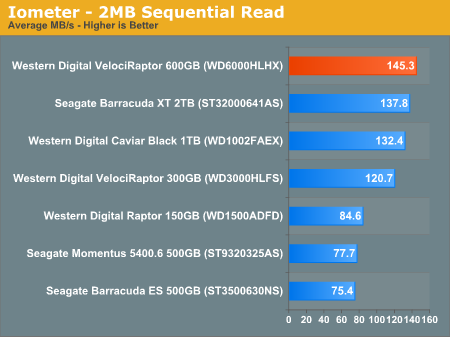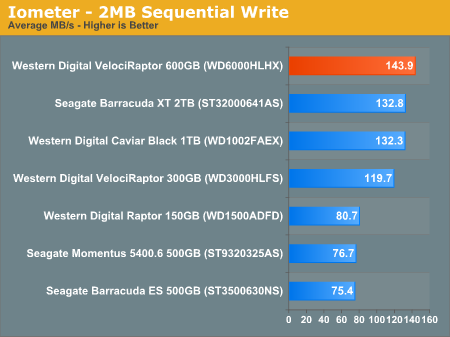Western Digital's New VelociRaptor VR200M: 10K RPM at 450GB and 600GB
by Anand Lal Shimpi on April 6, 2010 8:00 AM EST- Posted in
- Storage
Sequential Read/Write Speed
Using the latest build of Iometer I ran a 3 minute long 2MB sequential test over the entire span of the drive. The results reported are in average MB/s over the entire test length:

This chart shows us Western Digital's problem. Prior to the VR200M series, high end current generation 1TB and 2TB drives were faster than the VelociRaptor. While it still had lower access times, the higher platter density of these newer TB drives gave them a measurable advantage in sequential write speed.
The new 600GB VelociRaptor restores balance to the force and outpaces the old one by 20%. Newer drives are still behind, but the VR advantage is between 5 - 10%.

Unlike SSDs, hard drives have fairly symmetrical read/write performance. There are no changes here. Note that in terms of sequential performance, a 5400RPM notebook drive is roughly as fast as the old 150GB Raptor from 2006.










77 Comments
View All Comments
Makaveli - Tuesday, April 6, 2010 - link
I really think they should have gone with 300GB's platters dropped the 450GB model and release just a single platter 300GB's model and 2 platter 600GB model. Sell the 300GB model for $199 and the 600GB model for $299.I'm already using Intel SSD + 1TB Black for storage so I won't be buying one, raptors are dead to me!
efeman - Tuesday, April 6, 2010 - link
I have two VR150's in RAID-0. Is there any chance you could compare performance of the new VR's to that (or two VR300's, of course).Hacp - Tuesday, April 6, 2010 - link
Dear Anand,It would be helpful if you had some random latency tests, because that is what makes mechanical drives so horrible. Also, would be helpful if you did some short stroked benchmarks with this drive. Finally, I would like to compare it to an SSD drive. I know you are short on time but it would really make the review more interesting. Keep up the good work.
Anand Lal Shimpi - Tuesday, April 6, 2010 - link
The random tests actually give you latency, just represented in MB/s instead of ms.For example:
4KB random write test, 3 outstanding IOs:
VR200M got 1.9MB/s average write speed
That's 1945.6 KB/s (1.9MB/s * 1024KB/MB), which is 486.4 IOPS (1945.6KB/s / 4KB/IOP). That gives us IOs per second, or if we take the inverse we get seconds per IO: 2.05ms. Now since we've got 3 outstanding IOs that's 3 x 2.05ms or 6.16ms.
Latency is represented, just in the form of MB/s :)
Take care,
Anand
AstroGuardian - Tuesday, April 6, 2010 - link
Anand, please if you feel like telling us; you mentioned you have 1 x SSD and 2 x 1Tb drives in you personal computer in RAID1. What kind of 1Tb drives did you put there?Just a curiosity. I would like to know what your choice was...
Cheers
Anand Lal Shimpi - Tuesday, April 6, 2010 - link
I've got a pair of old Hitachi 1TB HDT721010SLA360 drives in my machine. I just used them because I had them laying around with no other purpose :)Take care,
Anand
pjconoso - Tuesday, April 6, 2010 - link
Are you actually using them? :) I could use a couple of those - 'wouldn't mind if they're slow as hell, lol.AstroGuardian - Wednesday, April 7, 2010 - link
Naaah dude, those drives are just great. We have plenty of those here in Europe. I have seen many defective Seagates, Spinpoints, few WDs but i have never seen a dead Hitachi (except for one of mine which i sent to death myself one angry morning...).Great choice Anand, but i still kind a think you chose those drives for a reason (what could that be lol) and not just because they were laying around. Haha....
strikeback03 - Thursday, April 8, 2010 - link
We have had one Hitachi, a Maxtor, a few Seagates, and a bunch of Samsung Drives die here at work.AstroGuardian - Thursday, April 8, 2010 - link
Haha, there you go. The Samsungs die every day. I have no idea what their issues are, especially those F3 - RAID Class drives. About the Maxtor i think it's time has come to pass away don't you think? Hehe